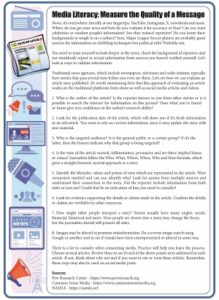By Matthew Barba
Missouri Press News
A new resource sheet focusing on media literacy can help your community, from students in high school to voters deciding between candidates at the polls, better evaluate the quality of information they consume.
The tip sheet, titled “Media Literacy: Measure the Quality of a Message,” was developed by Missouri Press Newspaper in Education Coordinator Helen Headrick at the request of Hannah Spaar, editor of The Odessan, Odessa, to support improved understanding by high school students of potential sources for misinformation and disinformation.
Access to information has never been easier, Headrick said, but it also has never been easier to publish and widely spread wrong information, whether accidentally (misinformation) or intentionally (disinformation).
“Media literacy defines the importance of validated news. Readers of all ages need to learn to be a responsible user and sharer,” Headrick said.
A January study by Boston University’s College of Communication showed 72 percent of Americans say skills in media literacy are important in the face of intentionally misleading or inaccurate information. Respondents were unsure about where they could access this type of training, with only 42 percent reporting they would know how to access quality media literacy training.
Spaar, who asked Headrick for help creating an easy-to-follow sheet for students in The Odessan’s coverage area, said NIE resources like the tip sheet and the overall program are important for teaching students how to consume all media, from their hometown newspaper to articles they read on national news outlet’s websites.
“As the world transitions into a new age of decentralized media, local newspapers remain one of the strongest ‘old school’ methods for readers to learn about the world around them,” Spaar said. “In a democracy, we need informed voters, leaders, business owners and community members in order for our communities to thrive.”
The Media Literacy tip sheet covers everything from knowing about the producer of the content, date of publication and who is the targeted audience. Tips also look at the tone of language, viewpoints reflected in content, supporting evidence and how the story might be interpreted by different audiences.
“In addition to reaching NIE students just starting to form their media habits, my hope is focusing on media literacy will also serve as a reminder to their parents and other readers who come across it of the need to pay attention to their news sources and to seek out high-quality journalism,” Spaar said.
The tip sheet also reminds that images may be altered to promote misinformation, so seeing may no longer be believing. Manipulated images, and sometimes outright fakes have become increasingly difficult to identify following the proliferation of artificial intelligence tools.
The tip sheet can be downloaded from bit.ly/MoMediaLit if you want to republish it in your newspaper, on your website or provide the tip sheet to schools in your coverage area.
Missouri legislation
A bill introduced in the current Missouri General Assembly, House Bill 1513, The Media Literacy and Critical Thinking Act, would require the state’s Department of Elementary and Secondary Education to establish a “Media Literacy and Critical Thinking” pilot program, with five to seven “diverse schools” being chosen for the pilot program.
Under the bill, which was voted “do pass” by the Missouri House Elementary and Secondary Education Committee in February, defines media literacy to include a “a person’s ability to access, analyze, evaluate, and participate with all forms of media, including news in print and social media content, and recognize bias and stereotypes in media, as well as Internet safety.”
The program would address media literacy, develop strategies for student learning in classroom curricula, and demonstrate various literacy strategies used. Pilot program schools would then provide a report to DESE, which would compile a summary for the General Assembly by Jan. 1, 2028.



